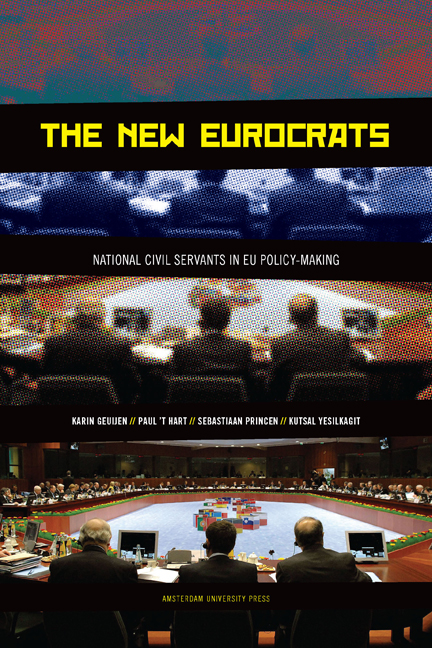Book contents
- Forntmatter
- Contents
- Tables and Figures
- Acknowledgements
- Chapter One Studying Eurocrats At Work
- Chapter Two Toward a Europeanised Civil Service? a Survey Study
- Chapter Three Eurocratic Work As Strategic Behaviour: Moving Before the Commission Does in Veterinary Policy
- Chapter Four Getting Things Done in European Police Co-Operation
- Chapter Five Bridge Builders Or Bridgeheads in Brussels? the World of Seconded National Experts
- Chapter Six Understanding Eurocratic Work: Conclusions and Reflections
- Appendix: Items on Europeansation Included in the ‘Pomo’ Survey
- Notes
- Bibliography
- About the authors
- Index
Chapter One - Studying Eurocrats At Work
Published online by Cambridge University Press: 15 January 2021
- Forntmatter
- Contents
- Tables and Figures
- Acknowledgements
- Chapter One Studying Eurocrats At Work
- Chapter Two Toward a Europeanised Civil Service? a Survey Study
- Chapter Three Eurocratic Work As Strategic Behaviour: Moving Before the Commission Does in Veterinary Policy
- Chapter Four Getting Things Done in European Police Co-Operation
- Chapter Five Bridge Builders Or Bridgeheads in Brussels? the World of Seconded National Experts
- Chapter Six Understanding Eurocratic Work: Conclusions and Reflections
- Appendix: Items on Europeansation Included in the ‘Pomo’ Survey
- Notes
- Bibliography
- About the authors
- Index
Summary
Emerging Eurocracy: National civil servants and European Integration
Civil servants from the various European Union (EU) member states are among the most ubiquitous and important players in European governance. Within the formal EU structures, they are involved in a myriad of Commission expert groups, Council working parties, and ‘comitology’ committees, as well as a range of advisory committees. In these various groups and committees, their roles vary from preparing decisions and giving advice to approving proposals on behalf of their political superiors and taking or implementing decisions. In addition, civil servants are active outside of these formal EU-related structures, either in independent networks of officials and regulators or in ad hoc contacts with their counterparts in other countries.
Together, these civil servants form a dense web of what Slaughter (2004) has called ‘government networks’. In her study of government networks, Slaughter showed the vast array of functions they perform in terms of exchanging information, co-ordinating the enforcement of regulations, and harmonising national regulations when those regulations have effects across borders. According to Slaughter, the rise of government networks is indicative of a ‘new world order’, in which states no longer present themselves on the international scene as unitary actors, speaking and acting with one voice, but rather as disaggregated states in which functionally specialised parts of government directly interact with their counterparts in other countries.
Despite the importance of civil servants in international and EU governance, relatively little is known about who they are and what they do. National civil servants take centre stage in three strands of literature. The best known of these strands is the literature on the national co-ordination of EU policies (cf. Harmsen 1999; Kassim et al. 2000; Peters and Wright 2000). The central concern of these studies is how the domestic administrations of EU member states co-ordinate internally in order to produce a ‘national position’ in Brussels. Given this specific concern, this literature pays less attention to what civil servants actually do when they go to Brussels. Second, a group focused on Scandinavian scholars has conducted a number of surveys among domestic civil servants.
- Type
- Chapter
- Information
- The New EurocratsNational Civil Servants in EU Policy-making, pp. 13 - 30Publisher: Amsterdam University PressPrint publication year: 2008



